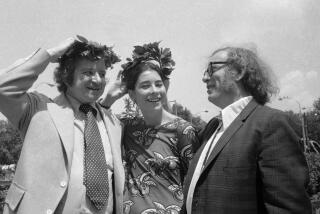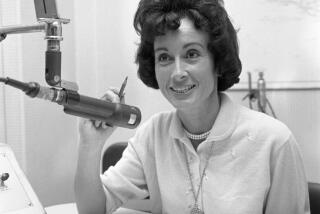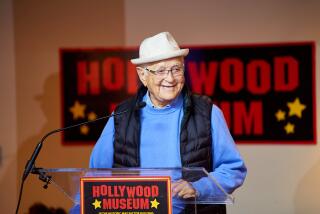Connie Martinson dies; TV host chatted up more than 2,000 authors on long-running show
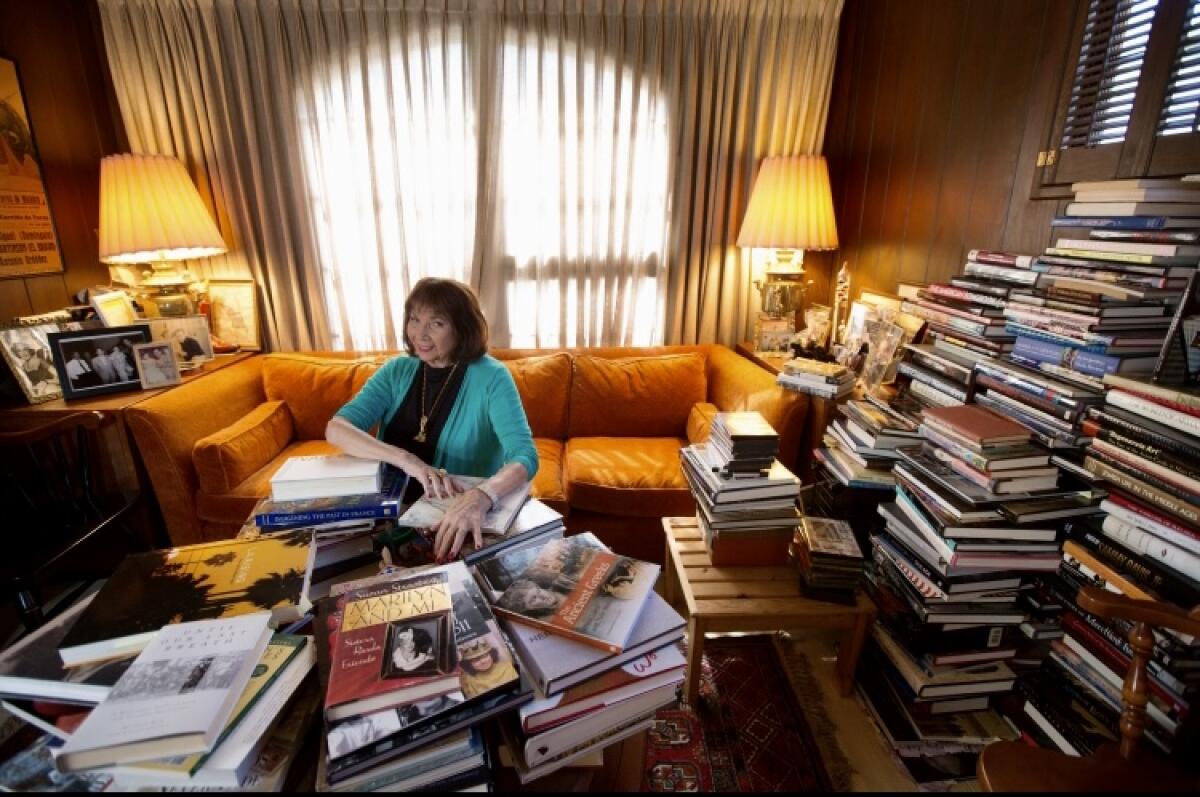
Connie Martinson, an insatiable reader and admirer of writers, who interviewed thousands of authors on her long-running cable television show, “Connie Martinson Talks Books,” has died at her home in Beverly Hills.
Martinson, who died peacefully on March 9, was 90.
Her cable television show began in 1979, and by the time it ended in 2015, it had been seen by millions nationally and in Canada. She interviewed an impressive roster of writers, among them an upward-bound Barack Obama, eloquently discussing his then-new book, “Dreams From My Father,” in 1995, as well as such other prominent fiction and nonfiction authors as Walter Mosley, Ray Bradbury, Maya Angelou, Studs Terkel, Norman Mailer, Carolyn See, Joyce Carol Oates and Amos Oz.
“Connie Martinson was an essential part of the literary life of this city,” said author Janet Fitch, whose novel, “White Oleander,” was a bestseller, Oprah’s Book Club selection and was made into a film.
“She was a great interviewer, and she read your book really carefully. She had such clarity and insight and could zoom right in on what was most important. There was also something soothing about the liveliness of her face and eyes. You saw the spark of pleasure she had in reading and in talking about reading. She was the sort of person you would want to sit next to at a dinner party.”
Nearly 2,000 of Martinson’s interviews are now accessible on the Claremont Colleges Digital Library site, where she donated her tapes in 2008. As of this week, the digital library has 1,801 now-digitized items in the Connie Martinson Talks Books Collection.
Martinson was “incredibly curious, very smart and very disarming,” said Rick Wartzman, former executive director of the Drucker Institute, who in that role acquired the collection and made it available through the school’s digital library. “I eventually came to know what wide-ranging interests she had. Look at the list of people Connie landed interviews with — some of the greatest names in politics, culture, literature. In that respect alone, it’s priceless.”
She discussed antisemitism with A. Scott Berg and Alan Dershowitz, talked with Carlos Fuentes about Spain’s colonization of Mexico and questioned Michael Tolkin about his book “The Player” and Budd Schulberg about his book “What Makes Sammy Run?” Several women named Amy can be seen not only discussing their books but also talking about their writing process (Amy Ephron), entertaining guests (Amy Sedaris) and her mother’s reception to her book (Amy Tan).
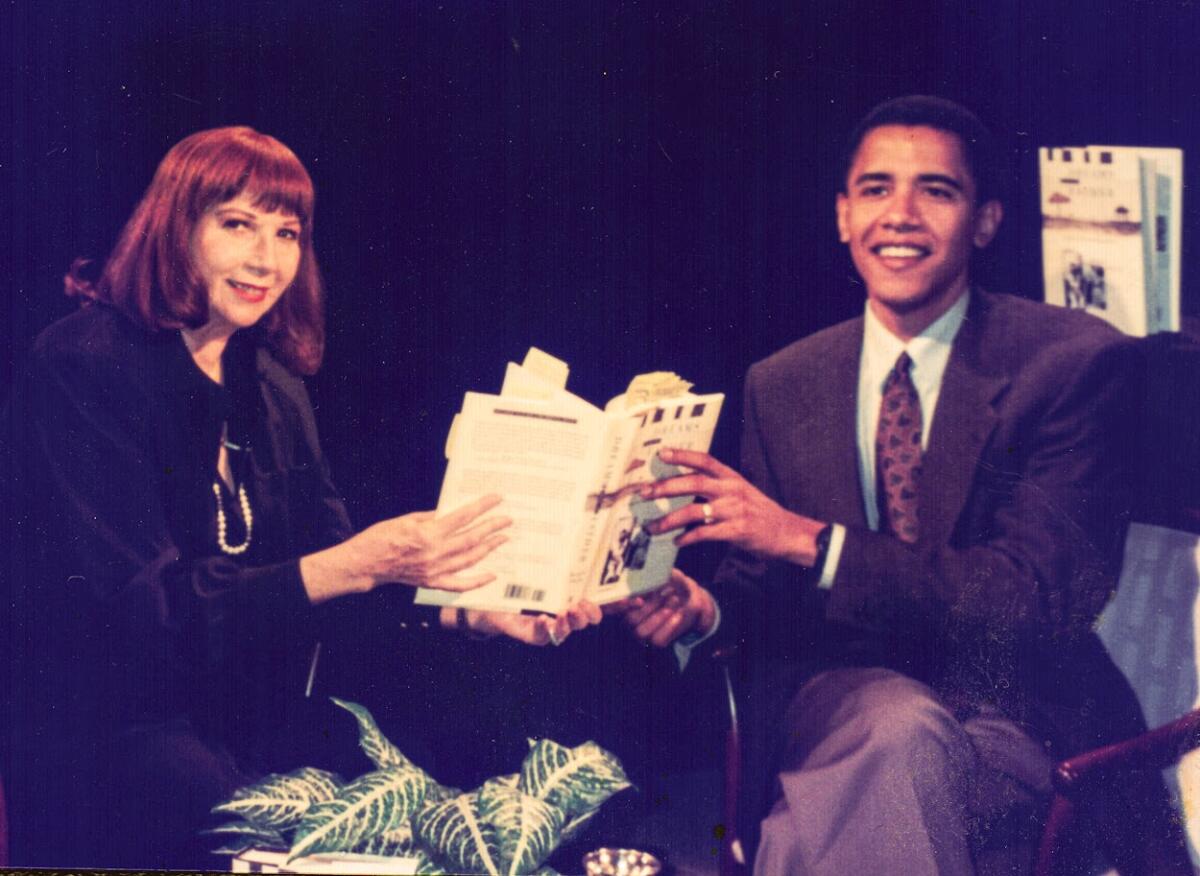
Among the nonfiction writers interviewed were such prominent journalists and essayists as Pete Hamill and Maureen Dowd. Novelist Sidney Sheldon did 10 interviews, and Ray Bradbury, with 14, was clearly a favorite. But Martinson also had first-time writers. “As long as it’s a book, then the author is a potential guest,” she once said.
Martinson could chat about almost anything, particularly whatever her guest’s subject might be. She’d get to the studio with a well-worn copy of a guest’s book, no matter how new the book was. Key pages were marked with dozens of yellow Post-its,and she knew the books so well she could often jump in with an answer if a guest stalled.
She was also a speed reader, noted her son-in-law, Douglas Carner. “She’d read the books so fast, you’d feel the breeze from the pages. And she would have read every single word.”
Martinson didn’t exactly plan her career path, said her daughter, Julianna Carner, who manages the family business: “In the mid-’70s, my mother worked for the Coro Foundation, which trained young people for government work. When Coro was offered a radio show and turned it down, my mother said, ‘Oh, that sounds interesting. I’ll do it.’ She was up for any adventure that came along.
“She began by interviewing celebrities and others that she and my father knew through his work as a television and film director. Then, one day in 1979, she said, ‘I’m bored and have gone through all my friends.’ That’s when she came up with putting together the two things she liked doing the most: ask questions and read books. “
So began “Connie Martinson Talks Books.” Martinson started with a few writers such as Bradbury, whom she knew, and then moved on to people she sort of knew. Launched in Los Angeles in 1979, her show appeared on government and other cable stations around California, then on a New York City cable access station. Her show went national in the mid-’80s, and according to her daughter, Martinson was at her peak in the early ’90s, when she had 23 million viewers.
Carner worked with her mother for about two years in the early ’80s, also interviewing authors in one of the three 10-minute blocks that then comprised the show. “Afterwards, I said to my mother, ‘Thank you for doing this for me.’ And she said, ‘If you weren’t any good, I wouldn’t be doing this.’ And I adored that she said that.”
Constance Frye Martinson was born in Boston on April 11, 1932, and graduated from Wellesley College in Wellesley, Mass., where she was awarded the Davenport Prize for Speech and Literature. “Connie was always active in support of Wellesley College, her alma mater and mine, and the Los Angeles Wellesley Club,” said longtime friend Lee Ramer, a former member of Los Angeles’ Cultural Affairs Commission. “It was always interesting to listen to her interviews because she asked questions that all of us might ask.”
She worked as an editor for Writer magazine in Boston before moving to Los Angeles with her husband, Leslie Martinson, whom she married in 1955. Martinson, who died in 2016 at 101, directed such films as “PT 109,” the original “Batman” and such episodic TV shows as “Maverick,” “77 Sunset Strip” and “The Brady Bunch.”
Connie Martinson attributed the show’s success to her ability to get the authors to open up. “I try to hold the audience’s attention by trying to put them in my seat. I also want to know what makes the author tick, so I try to think how the ideas and rhythm came from each author,” she told Los Angeles Magazine in 2008.
“Writers would come to L.A. and do her show and Johnny Carson’s show,” said her son-in-law. “At the house are thousands of books, and they still have Post-its in them. It was very common for her to know things that the author of the book wouldn’t remember having written.”
Martinson’s show over the years was largely self-financed, Douglas Carner said, adding that his mother-in-law never wanted the show to be syndicated or commercial, because she didn’t want to lose control. “The mission was more important than the money,” he said. “Her feeling was if she could find one person who could discover the joy of holding a physical book, she would feel fulfilled.”
When each interview ended, she nearly always asked the author to autograph his or her book before reminding her viewers to support their local library.
Her passion for books and writers was clearly noted. “She was the grande dame of letters in Los Angeles for decades,” said author, critic and Jewish Journal book editor Jonathan Kirsch. “Her interview series was a venue for people promoting their books from all over the world. She was a local celebrity and a familiar face and name in the book community. There was no book-related event that I attended where I didn’t see Connie.”
Martinson is survived by her daughter, son-in-law, grandson Richard Carner and grandson-in-law Michael Carner.
Isenberg is a former Times staffer, the author of “Conversations With Frank Gehry” and the subject of one of Martinson’s interviews.
More to Read
Sign up for our Book Club newsletter
Get the latest news, events and more from the Los Angeles Times Book Club, and help us get L.A. reading and talking.
You may occasionally receive promotional content from the Los Angeles Times.
